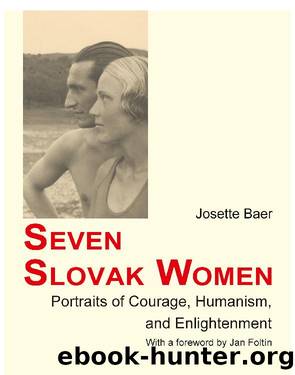Seven Slovak Women by Josette Baer

Author:Josette Baer [Baer, Josette]
Language: eng
Format: epub
Tags: Slovakia, Women, Politics
ISBN: 9783838267081
Publisher: Ibidem Press
Published: 2015-04-10T00:00:00+00:00
IV. 5 Conclusion
At the end of 1968, it was quite obvious that the government could not continue the reform course; after Husák's election as General Secretary in April 1969 the Party machinery intensified its pressure.[256]
Censorship was not yet officially re-introduced, but the Party organs found a way of controlling the mass media. Kultúrny život had been shut down already in September 1968; Czech and Slovak journalists and their professional organizations expressed their support for the government's line, caving in to political pressure. The weekly Nové slovo (New Word) became the platform of the normalizers.
Party members had to undergo verification; if they refused to openly express their approval of the "international assistance [internacionálnou pomocou] of August 1968" they lost their Party card, and as a consequence, their jobs in the state administration, factories, educational institutions and army.[257] They were then employed in jobs they were over-qualified for and received a significantly lower salary. The higher positions were filled with personnel less qualified but reliable in political terms.
The purges did not hit the Slovaks as hard as the Czechs; while many Czech intellectuals were condemned to manual labour, for example Havel, who worked in a brewery in Trutnov, the Slovak intellectuals were able to find niches. The politically persecuted lost their positions at the Academy of Sciences, the universities, technical universities and schools but they could find employment at libraries and museums, which left them at least a minimal chance of continuing to use their professional qualifications in private.[258] The ban on publication hit the Slovaks and Czechs scientists and intellectuals equally hard.
Anna's academic career was practically finished with the invasion, not only because she had actively participated in the reform politics in 1968. While some two hundred historians had been fired in the Czech part, she was still employed at Comenius University and a member of the board of the Slovak Historical Society (výbor Slovenskej historickej spoloÄnosti); in this function, she wrote a letter to the chairman in May 1970:
"I am concerned about the future work and subsistence of our fellow historians, whose downgrading to positions they are over-qualified for is not only damaging them on a personal level, ⦠but is also damaging historiography as an academic subject. Since the Czech colleagues are already in a desperate situation, I would like to suggest, indeed, to ask that you ⦠find an appropriate way of expressing your opinion about the future development of Czechoslovak historiography. I would like to hope that you stand up for those persecuted for their views ⦠enabling them to continue their scientific work."[259]
She did not have to wait long for an answer: she was sacked and lost her Party membership the very same year. She managed to find employment as chief archivist at the Slovak State Scientific Archive (Slovenský Å¡tátný vedecký archÃv) in Bratislava on 1 February 1971. Naturally, she was banned from publishing, but continued her research in private. Her manuscript The End of the Political Parties, Professional Organizations and Associations in the Years 1938â1940
Download
This site does not store any files on its server. We only index and link to content provided by other sites. Please contact the content providers to delete copyright contents if any and email us, we'll remove relevant links or contents immediately.
Fanny Burney by Claire Harman(26593)
Empire of the Sikhs by Patwant Singh(23070)
Out of India by Michael Foss(16846)
Leonardo da Vinci by Walter Isaacson(13315)
Small Great Things by Jodi Picoult(7116)
The Six Wives Of Henry VIII (WOMEN IN HISTORY) by Fraser Antonia(5496)
The Wind in My Hair by Masih Alinejad(5085)
A Higher Loyalty: Truth, Lies, and Leadership by James Comey(4947)
The Crown by Robert Lacey(4805)
The Lonely City by Olivia Laing(4797)
Millionaire: The Philanderer, Gambler, and Duelist Who Invented Modern Finance by Janet Gleeson(4462)
The Iron Duke by The Iron Duke(4349)
Papillon (English) by Henri Charrière(4258)
Sticky Fingers by Joe Hagan(4188)
Joan of Arc by Mary Gordon(4098)
Alive: The Story of the Andes Survivors by Piers Paul Read(4017)
Stalin by Stephen Kotkin(3956)
Aleister Crowley: The Biography by Tobias Churton(3628)
Ants Among Elephants by Sujatha Gidla(3459)
